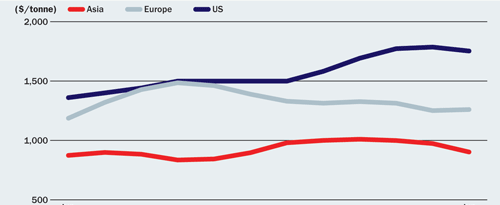Benchmark West Texas Intermediate for April delivery fell below $101 on weak economic news from the U.S. and China, but rallied back quickly after the report from Saudi Arabia to be down just 67 cents at $103.73 per barrel in afternoon trading on the New York Mercantile Exchange.
Oil fell as low as $100.62 Thursday morning, the lowest price in a week. The reaction to the Saudi development shows how sensitive the market is at the moment to news from the Middle East. Oil prices soared above $100 per barrel last week as an uprising in Libya essentially shut down the country’s exports.
Earlier in the day, economists were warning that the recent surge in fuel prices will eventually slow economic growth.
The U.S. is consuming more gasoline than a year ago, even though the price has jumped 50 cents per gallon in just three months. But consultants who track spending on gasoline say Americans may finally be pulling back.
Motorists have started to spend less on gasoline than they were spending at the same time last year, according to SpendingPulse, a research firm that tracks retail spending. Consumers were buying more in February, and that trend was supposed to continue toward the summer.
The rapid increase in gas prices “blew through” everyone’s comfort level, SpendingPulse Vice President Michael McNamara said. It’s unclear how long this will last, but McNamara called it the first real sign that consumers are rearranging their habits to conserve gas.
Economist Michael Lynch said consumers will cut back on driving even more in coming months if oil remains above $100 per barrel. “We’re past the point of, ‘Oh, it’s only going to be up for a few days,'” Lynch said. “I think people are already starting to change their behavior, and they’re modifying their vacation plans as we get closer to the summer.”
The economic news Thursday helped fuel the earlier oil sell-off. China, which is expected to drive oil demand for years to come, reported overnight that surging oil and commodity prices produced a surprising trade deficit of $7.3 billion for February. And the U.S. Labor Department reported that the number of people seeking unemployment benefits rose last week.
The U.S. dollar also gained against other major currencies. Oil, which is priced in dollars, tends to fall as the greenback rises and makes barrels more expensive for buyers holding foreign currency.
“When you’ve risen as quickly as we have, there’s always going to be a risk of a big drop when you hear stories that say the world isn’t as wonderful as you think,” said Tom Kloza, publisher and chief oil analyst at Oil Price Information Service.
Life Inc.: Consumers bracing for $4-plus gas
Oil company shares dropped as oil fell. Exxon Mobil Corp., Chevron Corp., BP, Total, ConocoPhillips, Occidental Petroleum Corp., and Royal Dutch Shell all fell at least 2 percent.
The oil industry has tried to ease concerns recently, saying the rise in prices was mostly due to speculation and there’s still plenty of crude to meet world demand. But investors continue to worry about future supplies. Although Saudi Arabia and other OPEC members have said they will cover any shortfall from Libya, the wave of unrest in North Africa and the Middle East will make it harder to crank up production if another crisis affects shipments elsewhere, traders said.
Natural gas fell 9.8 cents to $3.832 per 1,000 cubic feet after the government said U.S. supplies are still higher than last year despite a drop in price. U.S. inventories have been growing as new technologies allow companies to tap underground shale deposits.
In other Nymex trading for April contracts, heating oil lost about 1 cent to $3.062 per gallon and gasoline fell less than a penny to $3.0284 per gallon.
In London, Brent crude lost 45 cents at $115.49 per barrel.
Source : www.msnbc.msn.com








